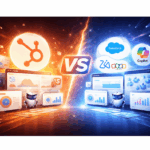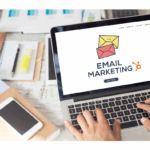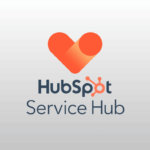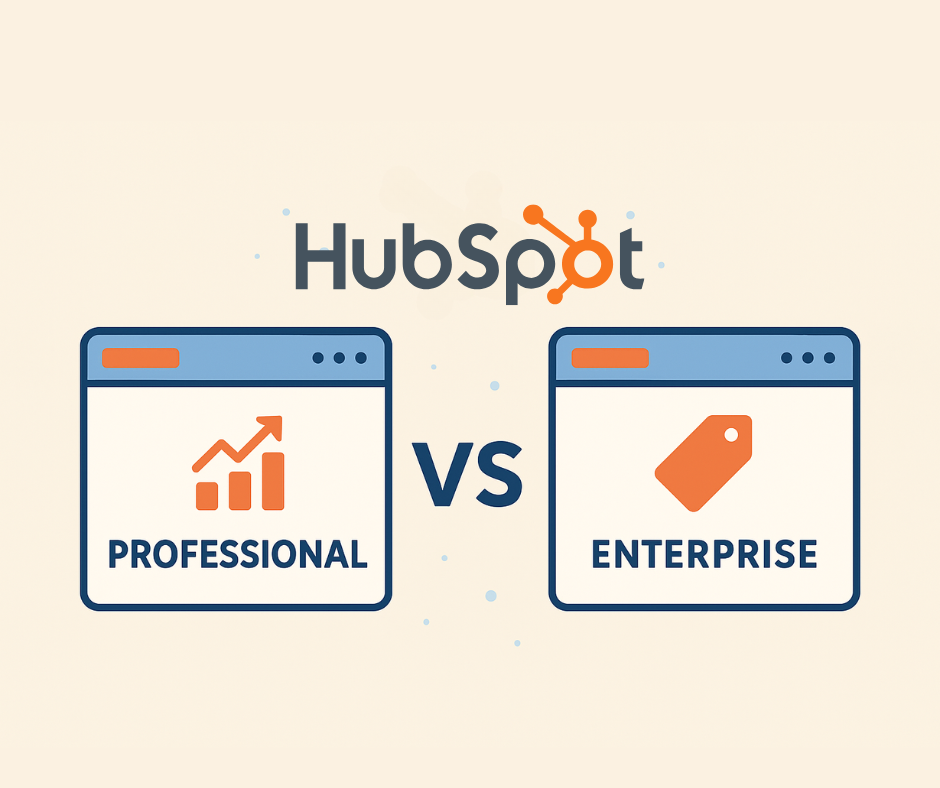
HubSpot Sales Hub Professional vs. Enterprise: Which is Right for You?
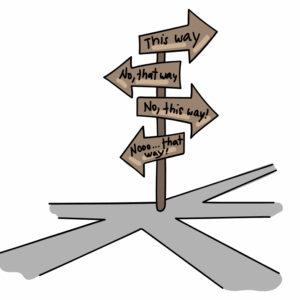
The Crossroads of Growth
Your sales team is growing. Your processes, once handled by a handful of people, are becoming more complex. You’ve outgrown the basics, and your current tools are starting to creak under the pressure. You know it’s time for a more powerful sales engine, and you’ve found yourself at a critical crossroads: the decision between HubSpot Sales Hub Professional and HubSpot Sales Hub Enterprise.
This isn’t just about getting more features; it’s about choosing the right operating system for your entire sales organization. Is Professional the powerful upgrade you need to build a repeatable sales machine, or is Enterprise a necessary investment to manage complexity, security, and scalability?
This article will break down the key differences between Sales Hub Professional and Enterprise, not just by features, but by the business problems they solve. By the end, you’ll have a clear framework for deciding which tier is the perfect fit for your team’s current needs and future strategic goals.
At a Glance: A 30-Second Gut Check
To quickly orient yourself, here’s a high-level overview of which tier is designed for which type of business:
Sales Hub Professional is for: Growing sales teams, typically ranging from 5 to 50 reps. The focus is on standardizing a proven sales process, implementing powerful automation to save time, and getting robust sales analytics to drive consistency and efficiency. The goal is to build a repeatable, well-managed sales machine.
Sales Hub Enterprise is for: Large, sophisticated sales organizations, often with 50+ reps, multiple teams, or global operations. These teams require advanced customization, granular control over permissions, sophisticated revenue attribution reporting, and predictive analytics to manage immense complexity and security at scale.
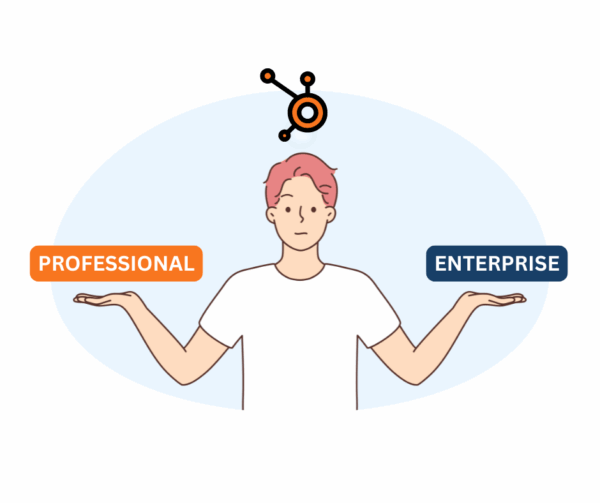
The Core Showdown: Comparing Key Feature Categories
The real difference between Sales Hub Professional and Enterprise becomes clear when you look at how their features address a business’s operational maturity.
Section 3.1: Sales Automation & Process Efficiency
Professional: The Engine of Standardization
Key Points: This tier provides the foundational tools for building a streamlined, repeatable sales process. You get sales sequences for automated follow-ups, deal and quote-based workflows for consistent deal stages, e-Signatures to speed up contract cycles, and robust sales analytics to track team performance. You also get 1:1 video messaging to personalize outreach.
Benefit: Professional empowers a growing team to move from an ad-hoc process to a standardized, efficient, and well-documented sales machine.
Enterprise: The Brain of Sophistication
Key Points: Enterprise takes automation and process to a whole new level. Key additions include Playbooks (interactive content cards that guide reps through calls or meetings), Custom Objects (to model unique data that doesn’t fit standard records), Predictive Lead Scoring (an AI-powered model that ranks your leads), and Advanced Quote-based Workflows.
Benefit: Enterprise enforces best practices in real-time with Playbooks, provides the ultimate customization with Custom Objects, and uses AI to help reps focus on the most valuable leads, all of which are essential for complex, high-volume sales.
Section 3.2: Reporting & Analytics
Professional: Clear Visibility into Performance
Key Points: Professional gives you the tools to move beyond basic reporting. You get custom reporting, sales forecasting, and the ability to build customizable dashboards.
Benefit: This tier allows you to track the specific KPIs that matter to your business (e.g., win rate by deal type, forecast accuracy) and get a clear view of your sales funnel.
Enterprise: Deep Insights & Revenue Attribution
Key Points: Enterprise answers the most complex and valuable business questions. It provides Advanced Custom Reporting, Multi-touch Revenue Attribution (which tells you which marketing and sales efforts truly influenced a deal), and Conversation Intelligence (CI) with call transcription and analysis.
Benefit: CI provides deep, actionable insights from sales calls at scale, while multi-touch revenue attribution gives your C-suite a clear picture of exactly which activities are driving revenue.
Section 3.3: Team Management & Security
Professional: Structure for a Growing Team
Key Points: This tier provides the necessary structure to manage your first few teams or sales processes. You get multiple deal pipelines, teams, and the ability to enforce required fields.
Benefit: Professional gives you the tools to organize your data and sales motion as you grow, ensuring basic data hygiene and process consistency.
Enterprise: Granular Control for a Complex Organization
Key Points: Enterprise provides the granular control a large organization requires. Key features include Hierarchical Teams (e.g., regional teams reporting up to a national director), User Roles & Field-Level Permissions (precise control over who can see/edit what data), and Single Sign-On (SSO).
Benefit: These features are crucial for compliance, data security, and managing complex team structures. They give you the confidence that your data is secure and that user access is tightly controlled, which is a non-negotiable for most large organizations.
Making the Call: Decision-Making Scenarios
Ultimately, the best choice depends on your business’s current challenges and future goals.
Choose Sales Hub Professional If…
Your primary goal is to move from an ad-hoc sales process to a standardized and repeatable one.
You need to automate repetitive tasks and follow-ups to free up your reps’ time.
You have a single core sales team or a few distinct teams with similar needs.
You need solid forecasting and custom reports but don’t yet require deep revenue attribution.
Your team has fewer than 50 reps and a relatively straightforward sales process.
Upgrade to Sales Hub Enterprise If…
You manage multiple, distinct sales teams with different roles, regions, and access needs (e.g., SDRs, Account Executives, Channel Partners).
Your business model requires tracking unique data points that don’t fit standard objects (e.g., subscriptions, locations, projects). This is where Custom Objects are a non-negotiable.
You need to enforce a specific sales methodology and provide reps with in-the-moment guidance (Playbooks).
Your C-suite is asking for sophisticated reports that tie specific campaigns and sales activities directly to closed-won revenue (Revenue Attribution).
IT and security require enterprise-grade controls like SSO and granular field-level permissions.
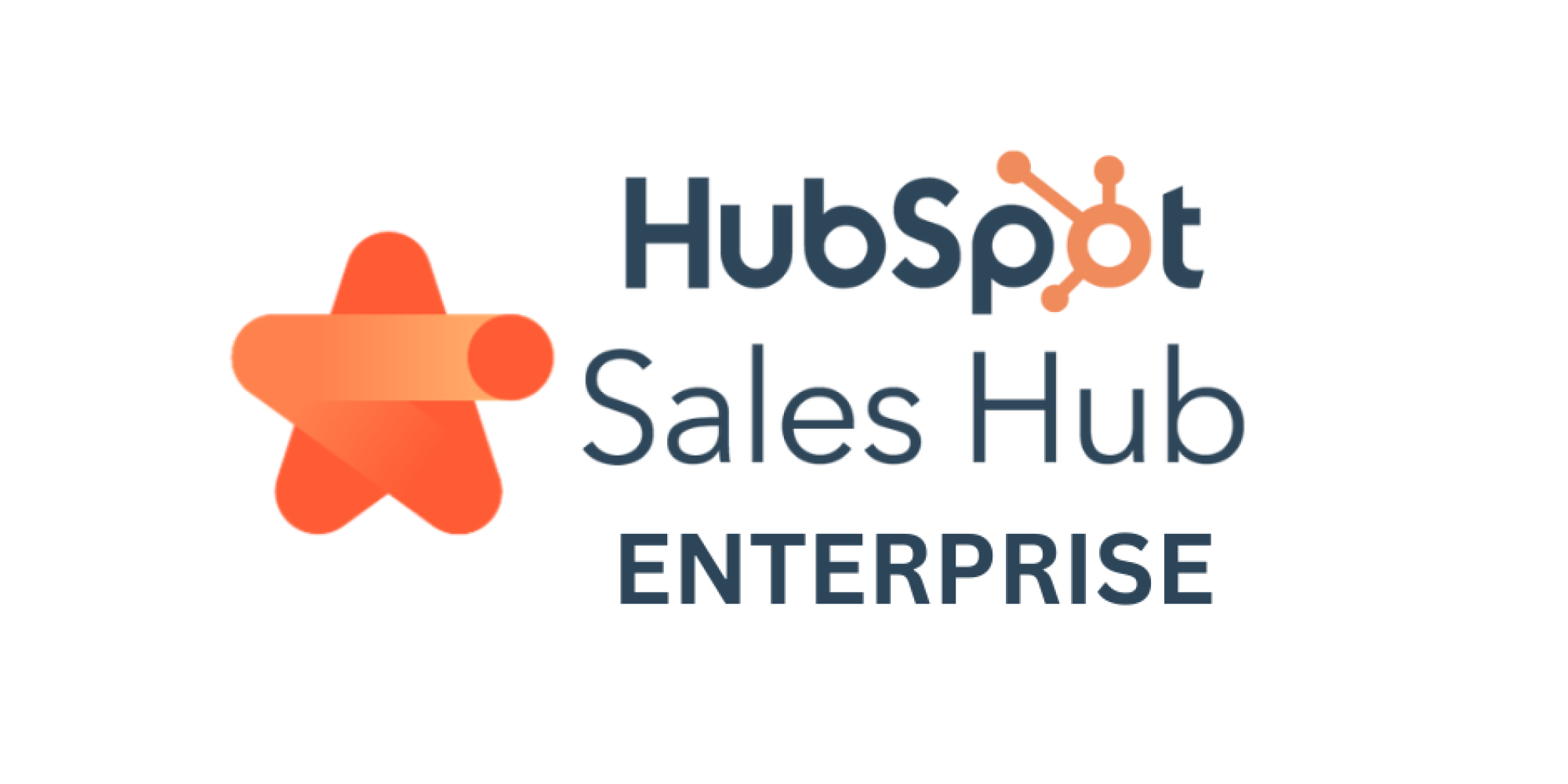
Don’t Forget the Price: Is Enterprise Worth the Investment?
The price difference between Sales Hub Professional and Enterprise is significant, and it’s a decision that shouldn’t be taken lightly. However, it’s crucial to frame this decision as an ROI analysis, not a simple cost comparison.
The cost of Professional is an investment in efficiency.
The cost of Enterprise is an investment in intelligence, control, and scalability.
To truly assess the value, consider the cost of not having Enterprise features. For example:
What is the value of one extra deal closed per quarter because a rep focused on a lead ranked high by predictive scoring?
How much time is saved by using Playbooks to guide reps, instead of manual coaching?
What is the value of answering your C-suite’s most pressing questions with multi-touch revenue attribution?
What is the risk of a data breach or compliance failure without SSO and advanced permissions?
These are the strategic questions that turn the Enterprise price tag from a cost into a valuable, justifiable investment.
The Right Hub for Your Journey
The choice between Sales Hub Professional and Enterprise is a powerful signal about the maturity and complexity of your sales organization. Professional is an incredible tool that helps you build, standardize, and optimize your sales process. Enterprise, on the other hand, is the necessary investment that allows you to scale, customize, and secure that process for a large, sophisticated organization.
The right choice isn’t about getting the most features; it’s about matching the platform’s capabilities to your company’s current and future strategic needs. Choose the tier that will remove friction today and provide a long-term runway for growth tomorrow.
Ready to choose the right HubSpot tier for your business?
Resources:
HubSpot Sales Hub Pricing & Features Page: https://www.hubspot.com/pricing/sales
HubSpot Blog – Sales Hub: https://blog.hubspot.com/sales
HubSpot Knowledge Base – Sales Hub: https://knowledge.hubspot.com/sales
